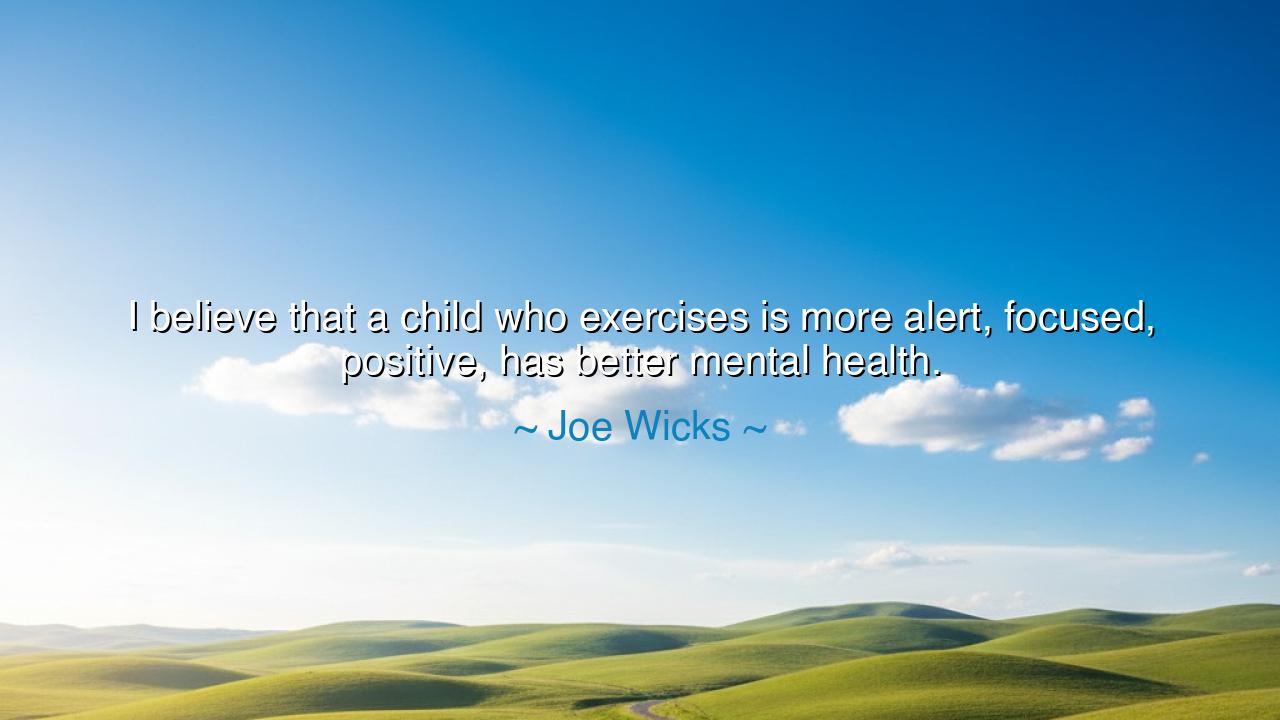
I believe that a child who exercises is more alert, focused
I believe that a child who exercises is more alert, focused, positive, has better mental health.






“I believe that a child who exercises is more alert, focused, positive, has better mental health.” Thus spoke Joe Wicks, the teacher of vitality, whose work has rekindled in modern hearts the ancient truth that movement is the seed of harmony — that the strength of the body and the clarity of the mind are bound together as the roots and branches of the same tree. In this simple yet profound declaration, Wicks speaks not only of exercise, but of balance, joy, and the shaping of a whole human being. His words are not a prescription for the body alone, but a hymn to the unity of spirit and flesh — a truth known to the ancients and forgotten by the hurried world of today.
In the wisdom of old, the educators of Greece and Rome understood what Wicks now proclaims anew. The philosopher Plato himself taught that the body must be trained alongside the mind, for only through movement could the soul achieve discipline, focus, and peace. The Spartans raised their youth not merely for battle, but for the art of living — teaching them endurance, control, and self-mastery. The early Olympians did not compete only for glory, but to honor the divine order that joined health of body with harmony of spirit. They believed that exercise was not a luxury of strength, but a moral duty — a means by which human beings honored life itself.
In modern times, however, much of this wisdom has been lost. Children now are confined not by chains, but by screens and stillness. Their bodies grow idle, and with that idleness, the spark of vitality dims. Their minds, deprived of movement, become restless yet weary, distracted yet dull. The energy that once flowed through the whole being — that sacred current linking mind, heart, and muscle — now stagnates. And from this stillness arises imbalance: anxiety, lethargy, disconnection. It is against this tide that Joe Wicks raises his voice, calling the world to remember that movement is not merely physical — it is spiritual nourishment, the fountain of both alertness and joy.
Science now confirms what the ancients felt in their bones: that exercise sharpens the mind and awakens the spirit. When a child runs, plays, or stretches toward the sky, the heart pumps not only blood but confidence; the lungs draw not only air but clarity. The chemistry of life itself transforms — the body releases endorphins, the mind becomes focused, the heart lightened. Wicks sees this as a teacher sees the awakening of his students — that when the body is alive, the mind opens like a flower at dawn. Movement, he reminds us, is the antidote to despair, the silent medicine of resilience.
History gives us shining examples of this truth. In the Renaissance, Leonardo da Vinci — painter, inventor, philosopher — wrote that “motion is life.” He would study the gait of horses, the stretch of muscles, the rise and fall of wings, for he knew that beauty and understanding came from observing life in motion. The great minds of that age walked as they thought, sketched as they wandered, and found their greatest insights not in stillness, but in movement. Their art and science were born of the same principle that Wicks teaches the children of our own age: that when the body moves, the mind awakens to its fullest power.
But Wicks’s wisdom reaches deeper still. His words are not about competition or strength for its own sake, but about mental health, the harmony of the inner world. The child who exercises learns discipline without punishment, focus without pressure, and confidence without pride. In play and motion, they learn the rhythm of breath and the steadiness of heart — lessons that will serve them in every trial of life. Physical health becomes the soil from which mental clarity and emotional stability grow. And thus, the child who moves learns not only how to live, but how to live well.
The lesson, then, is this: movement is medicine — not just for the body, but for the soul. Teach your children to move not because they must, but because it is their birthright. Let them run under the open sky, climb, stretch, dance, and discover their strength. Let them know the joy of feeling their own hearts beat in rhythm with life. For the body in motion gives rise to a mind in balance, and a mind in balance becomes the foundation of wisdom and peace.
So remember the words of Joe Wicks, and let them echo through the generations: “A child who exercises is more alert, focused, positive, has better mental health.” In these words lies a call not only for children, but for all humankind — to reclaim the ancient bond between movement and mindfulness. For in every step, in every heartbeat, the divine rhythm of life is restored. Move, then, with purpose and with joy, and you will find, as the ancients knew, that in caring for the body, you awaken the soul.






AAdministratorAdministrator
Welcome, honored guests. Please leave a comment, we will respond soon